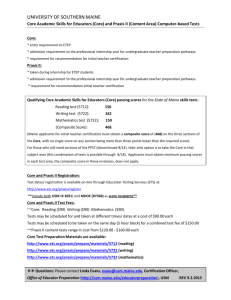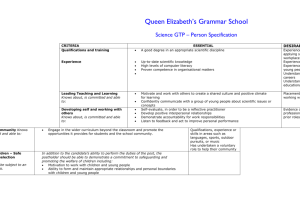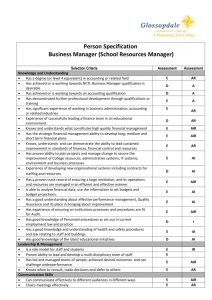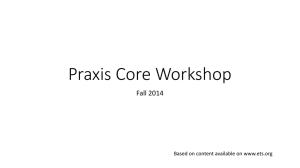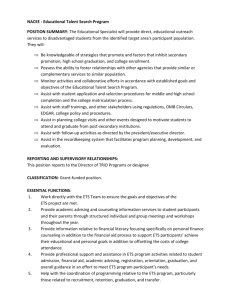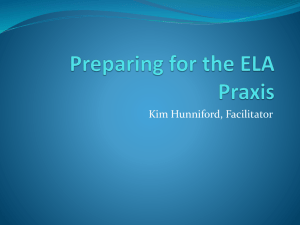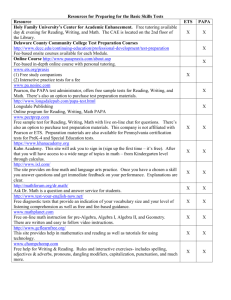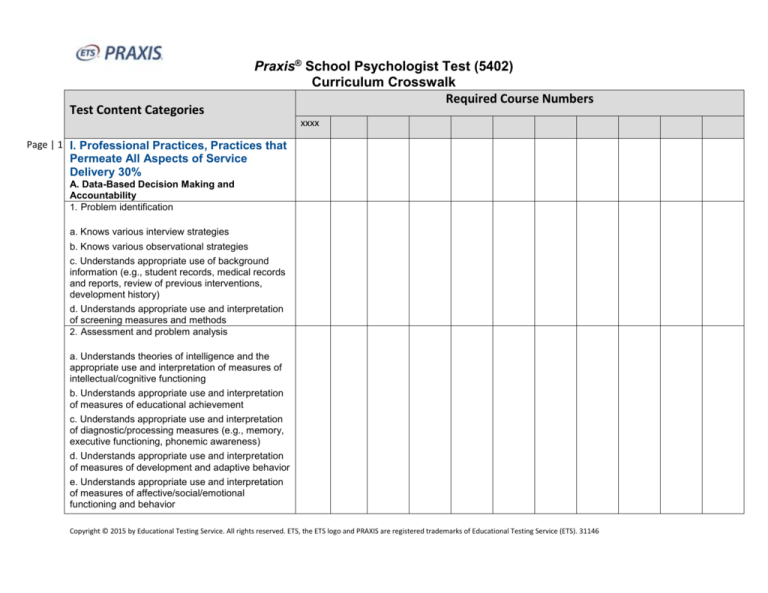
Test Content Categories
Praxis® School Psychologist Test (5402)
Curriculum Crosswalk
Required Course Numbers
xxxx
Page | 1 I. Professional Practices, Practices that
Permeate All Aspects of Service
Delivery 30%
A. Data-Based Decision Making and
Accountability
1. Problem identification
a. Knows various interview strategies
b. Knows various observational strategies
c. Understands appropriate use of background
information (e.g., student records, medical records
and reports, review of previous interventions,
development history)
d. Understands appropriate use and interpretation
of screening measures and methods
2. Assessment and problem analysis
a. Understands theories of intelligence and the
appropriate use and interpretation of measures of
intellectual/cognitive functioning
b. Understands appropriate use and interpretation
of measures of educational achievement
c. Understands appropriate use and interpretation
of diagnostic/processing measures (e.g., memory,
executive functioning, phonemic awareness)
d. Understands appropriate use and interpretation
of measures of development and adaptive behavior
e. Understands appropriate use and interpretation
of measures of affective/social/emotional
functioning and behavior
Copyright © 2015 by Educational Testing Service. All rights reserved. ETS, the ETS logo and PRAXIS are registered trademarks of Educational Testing Service (ETS). 31146
Praxis® School Psychologist Test (5402)
Curriculum Crosswalk
f. Knows appropriate use and interpretation of a
functional behavioral assessment
g. Is familiar with performance-based assessment
(e.g., work samples, portfolios)
Page | 2 h. Understands appropriate use and interpretation
of curriculum-based assessment/curriculum-based
measures
i. Knows appropriate use and interpretation of
ecological assessment (e.g., classroom, family,
community characteristics)
j. Knows how to use information and technology
resources to enhance data collection and decision
making
k. Understands the use of ongoing data collection
to systematically assess the quality and
effectiveness of academic, mental health and
system-level services (e.g., intervention design and
implementation, progress monitoring, treatment
fidelity/integrity, learning outcomes)
3. Knowledge of measurement theory and
principles
a. Knows to use a problem-solving framework as
the basis for all professional activities
b. Understands different types of test scores and
norms
c. Knows the strengths and limitations of various
types of assessment procedures (e.g., self-report
tests and inventories, multiple-choice tests,
interviews)
d. Is familiar with the principles of reliability and
validity
e. Is familiar with personal, social, linguistic,
environmental, racial and cultural factors that may
influence assessment procedures
f. Knows about test fairness concepts
Copyright © 2015 by Educational Testing Service. All rights reserved. ETS, the ETS logo and PRAXIS are registered trademarks of Educational Testing Service (ETS). 31146
Test Content Categories
Praxis® School Psychologist Test (5402)
Curriculum Crosswalk
Required Course Numbers
xxxx
Page | 3 4. Assessment of special populations
a. Is familiar with infant and early
childhood/preschool assessment procedures
b. Knows appropriate use and interpretation of
assessment procedures for English as a second
language/English-language learners (e.g., the
appropriate use of translators/interpreters,
measurement selection, language of assessment)
c. Is familiar with the assessment of students with
low-incidence exceptionalities (e.g., chronic health
impairments, severe physical disabilities, autism
spectrum disorders, sensory impairments)
d. Is familiar with screening for the gifted and
talented
B. Consultation and Collaboration
1. Models and methods of consultation used for
planning, implementing, and evaluating academic
interventions and mental health services
a. Knows to use a problem-solving framework as
the basis for all consultation and collaboration
activities when planning, implementing and
evaluating academic and mental health services
b. Knows the various models of consultation (e.g.,
behavioral, mental health, instructional,
organizational)
c. Knows the importance of facilitating
communication and collaboration among diverse
stakeholders (e.g., school personnel, families,
community professionals, etc.)
Copyright © 2015 by Educational Testing Service. All rights reserved. ETS, the ETS logo and PRAXIS are registered trademarks of Educational Testing Service (ETS). 31146
Test Content Categories
Praxis® School Psychologist Test (5402)
Curriculum Crosswalk
Required Course Numbers
xxxx
Page | 4 2. Home/school/community collaboration (studentlevel)
a. Knows strategies for working with a student’s
family (e.g., building relationships, collaborating on
intervention plans, promoting positive habits such
as building healthy lifestyles)
b. Knows strategies for working with community
agencies/providers to support a student’s success
II. Direct and Indirect Services for Children,
Families, and Schools (Student-Level Services)
23%
A. Interventions and Instructional Support to
Develop Academic Skills
1. Effective instruction at the individual and group
level
a. Is familiar with various instructional strategies
(e.g., cooperative learning, flexible grouping,
differentiated instruction, engagement time,
scaffolding, study skills, metacognition)
b. Knows common curricular accommodations and
modifications (e.g., information and assistive
technology, specially designed instruction)
c. Knows methods for helping students become
self-regulated learners, set and achieve individual
instructional goals, and assess outcomes
to see whether goals were attained
Copyright © 2015 by Educational Testing Service. All rights reserved. ETS, the ETS logo and PRAXIS are registered trademarks of Educational Testing Service (ETS). 31146
Test Content Categories
Praxis® School Psychologist Test (5402)
Curriculum Crosswalk
Required Course Numbers
xxxx
Page | 5 2. Issues related to academic success/failure
a. Understands the importance of using evidencebased strategies when developing interventions
b. Knows factors related to academic progress
(e.g., school/classroom climate, family
involvement, motivation, socioeconomic status,
language competency, programming for ELL)
B. Interventions and Mental Health Services to
Develop Social and Life Skills
1. Primary, secondary and tertiary preventive
strategies
a. Is familiar with common classroom organization
and management techniques (e.g., time
management, classroom rules, physical
environment)
b. Knows how to conduct individual and smallgroup programs (e.g., social skills training, conflict
resolution)
c. Is familiar with risk factors associated with
severe learning and mental health issues and
designs appropriate intervention plans to address
those issues
2. School-based intervention skills/techniques
a. Understands basic counseling techniques (i.e.,
individual, group)
b. Knows about appropriate intervention
techniques for various developmental levels
c. Understands applied behavioral analysis and
intervention
Copyright © 2015 by Educational Testing Service. All rights reserved. ETS, the ETS logo and PRAXIS are registered trademarks of Educational Testing Service (ETS). 31146
Test Content Categories
Praxis® School Psychologist Test (5402)
Curriculum Crosswalk
Required Course Numbers
xxxx
Page | 6 3. Child and adolescent psychopathology
a. Is familiar with common symptoms of mental
health issues and educational disabilities
b. Understands the impact mental health has on
the educational outcomes of children and
adolescents
c. Has a basic knowledge of psychopharmacology
III. Systems-Level Services 16%
A. Schoolwide Practices to Promote Learning
1. Is familiar with school-based organizational
development and systems theory
2. Is familiar with the importance of systems-level
resource mapping
3. Understands common educational
policies/practices (e.g., social promotion, highstakes testing, benchmarking, retention, tracking,
zero tolerance, corporal punishment)
4. Recognizes the importance of research
outcomes when designing school-based
intervention plans
5. Recognizes the importance of using knowledge
of research and organizational and systems theory
in the development of school improvement plans
B. Preventive and Responsive Services
1. Knows common school/system-wide prevention
programs (e.g., promoting safe school
environments, positive behavioral support, bullying
prevention, school climate assessment, policy
development, programs promoting good health)
Copyright © 2015 by Educational Testing Service. All rights reserved. ETS, the ETS logo and PRAXIS are registered trademarks of Educational Testing Service (ETS). 31146
Test Content Categories
Praxis® School Psychologist Test (5402)
Curriculum Crosswalk
Required Course Numbers
xxxx
Page | 7 2. Knows risk and protective factors as they relate
to a variety of issues (e.g., school failure, truancy,
dropout, bullying, youth suicide, school violence)
3. Knows a variety of crisis prevention and
intervention techniques
4. Is familiar with school/district-wide crisis
management planning, recovery and response
IV. Foundations of School Psychological
Service Delivery 31%
A. Diversity in Development and Learning
1. Recognizes the importance of culture,
background and individual learning characteristics
(e.g., age, gender or gender identity, cognitive
capabilities, social-emotional skills, developmental
level, race, ethnicity, national origin, religion,
sexual and gender orientation, disability, chronic
illness, language, socioeconomic status) when
designing and implementing interventions to
achieve learning and behavioral outcomes
2. Knows the importance of working with culture
brokers or community liaisons to understand the
needs of diverse learners
3. Recognizes personal biases or biases in others
that influence decision making, instruction,
behavior and long-term outcomes for students
4. Recognizes the importance of promoting
fairness and social justice in educational programs
and services
Copyright © 2015 by Educational Testing Service. All rights reserved. ETS, the ETS logo and PRAXIS are registered trademarks of Educational Testing Service (ETS). 31146
Test Content Categories
Praxis® School Psychologist Test (5402)
Curriculum Crosswalk
Required Course Numbers
xxxx
Page | 8 B. Research and Program Evaluation
1. Knows how to evaluate research
2. Knows how to translate research into practice
3. Understands research design and statistics
4. Knows how to incorporate data collection,
measurement, analysis, accountability and use of
technology resources into program evaluation
5. Knows how to provide assistance in schools and
other settings for analyzing, interpreting and using
empirical foundations for effective practices at the
individual, group and/or systems levels
C. Legal, Ethical and Professional Practice
1. Ethical principles related to the practice of
school psychology
a. Knows the NASP Principles for Professional
Ethics
b. Is familiar with the standards for educational and
psychological tests (e.g., APA, AERA, NCME)
c. Knows the importance of ethical practice in the
use of technology (e.g., report writing software,
confidentiality, electronic data storage and
transmission)
Copyright © 2015 by Educational Testing Service. All rights reserved. ETS, the ETS logo and PRAXIS are registered trademarks of Educational Testing Service (ETS). 31146
Test Content Categories
Praxis® School Psychologist Test (5402)
Curriculum Crosswalk
Required Course Numbers
xxxx
Page | 9 2. Legal issues related to the practice of school
psychology
a. Knows the common laws and regulations
governing the practice of school psychology
- Individuals with Disabilities Education Improvement
Act (IDEA, PL108-446, 2004)
- Section 504 of the Rehabilitation Act of 1973 (PL 93112)
- Americans with Disabilities Act (ADA, PL 101-336,
1990)
- Elementary and Secondary Education Act (PL 8910, 1965) and No Child Left Behind Act (PL 107-110,
2001)
- Buckley Amendment to the Family Educational
Rights and Privacy Act of 1974 (FERPA, PL 93-380)
b. Knows relevant case law that affects practice
PARC v. Commonwealth of Pennsylvania (1972)
- Lau v. Nichols (1974)
- Board of Education of the Hendrick Hudson Central
School District v. Rowley (1982)
- Irving Independent School District v. Tatro (1984)
- Oberti v. Clementon (1993)
- Newport-Mesa Unified School District v. State of
California Department of Education (2010)
- Larry P. v. Riles (1979)
c. Knows the rights of students (e.g., informed
consent, confidentiality, least restrictive
environment, manifestation determination,
seclusion and restraint)
Copyright © 2015 by Educational Testing Service. All rights reserved. ETS, the ETS logo and PRAXIS are registered trademarks of Educational Testing Service (ETS). 31146
Test Content Categories
Praxis® School Psychologist Test (5402)
Curriculum Crosswalk
Required Course Numbers
xxxx
Page | 10 d. Knows the ethical, professional and legal liability
of school psychologists (e.g., malpractice,
negligence, supervision, conflict of interest)
3. Professional foundations
a. Understands the importance of advocating for
children and their families (i.e., issues such as
disproportionality, poverty, access and equity)
b. Is familiar with the history of school psychology
c. Recognizes the importance of lifelong learning
and professional growth
d. Is familiar with the importance and value of
supervision and mentoring
To receive an accessible version of this document, please email praxis@ets.org.
Copyright © 2015 by Educational Testing Service. All rights reserved. ETS, the ETS logo and PRAXIS are registered trademarks of Educational Testing Service (ETS). 31146

